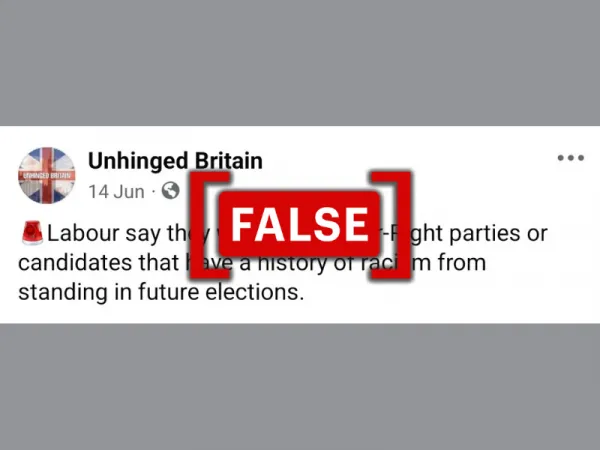By: Christian Haag
July 3 2024
 Example of the claim circulating on Facebook. (Source: Facebook/Screenshot/Edited by Logically Facts)
Example of the claim circulating on Facebook. (Source: Facebook/Screenshot/Edited by Logically Facts)
Labour has proposed no such policy. Only political organisations proscribed as terrorist can be banned in the UK.
Context
A false claim is circulating on Facebook that the Labour Party “say they will BAN any Far-Right parties or candidates that have a history of racism from standing in future elections“. The claim began circulating in the U.K. during the general election campaign, ahead of the vote on July 4, which Labour is projected to win.
However, the claim is false - Labour has not made such a statement. There are no legal provisions in the U.K. for one political party to ban another political party or candidate from participating in elections. The political process is regulated by the Electoral Commission, and parties are governed by electoral law.
In fact
Neither the Labour Party itself nor its leader, Sir Keir Starmer, has proposed a ban on far-right parties or candidates with a history of racism. Such a policy is not mentioned in Labour's 2024 manifesto, which outlines the political goals for Labour if they win the 2024 general election, nor on their website. There is no record of Starmer having made such a statement.
Logically Facts contacted Labour to address the claim but received no response.
The Electoral Commission is responsible for the registration of political parties in the U.K. Logically Facts spoke to the organization's Senior Communications Officer Conor Walsh, who told us: “Our role is to consider applications against the criteria set out in the Political Parties, Referendums and Elections Act 2000 (PPERA), and this is done alongside our public sector equality duty.” Welsh added: “The law on registration of a political party does not require a party’s political views or policies to be assessed”.
The Public Sector Equality Duty, regulated by the Equality Act 2010, also requires the Electoral Commission to consider a party's published constitution. “Where the rules of a party’s constitution could discriminate against someone on the basis of a protected characteristic(s), the constitution could be seen as unlawful, and we may refuse it,” Welsh said.
Individual candidates can be disqualified from standing for election or holding public office for a number of reasons. These include holding a disqualifying role, being bankrupt, or being convicted of several types of criminal offenses. These do not include holding far-right views or having a history of “racism” that is not linked to some kind of criminal conviction. Welsh clarified that any changes to this list would require a change to existing legislation, which would require a democratic parliamentary vote.
Political parties vs terrorist groups
There is a legal provision to proscribe groups involved in terrorist activities. This is regulated by the Terrorism Act of 2000, which makes it a criminal offense to belong to such an organization, effectively banning it. To be proscribed as a terrorist organization, it needs to be involved in terrorism under the following criteria: “commits or participates in acts of terrorism, prepares for terrorism, promotes or encourages terrorism (including the unlawful glorification of terrorism), is otherwise concerned in terrorism”.
The act defines terrorism as "the use or threat of such action must be designed to influence the government or an international governmental organization or to intimidate the public or a section of the public, and must be undertaken for the purpose of advancing a political, religious, racial or ideological cause."
Since the law was implemented, 81 organizations in the U.K. and abroad have been proscribed as terrorist organizations, and 14 organizations in Northern Ireland were proscribed using previous legislation. The majority of these are related to Salafi-jihadism but also include white supremacist and neo-Nazi groups, as well as the Russian Wagner group.
Verdict
This claim is false. The Labour Party has not proposed a ban on far-right parties or candidates. There is a separate legal provision for groups involved in terrorism to be proscribed in the U.K., but this does not apply to far-right political parties.